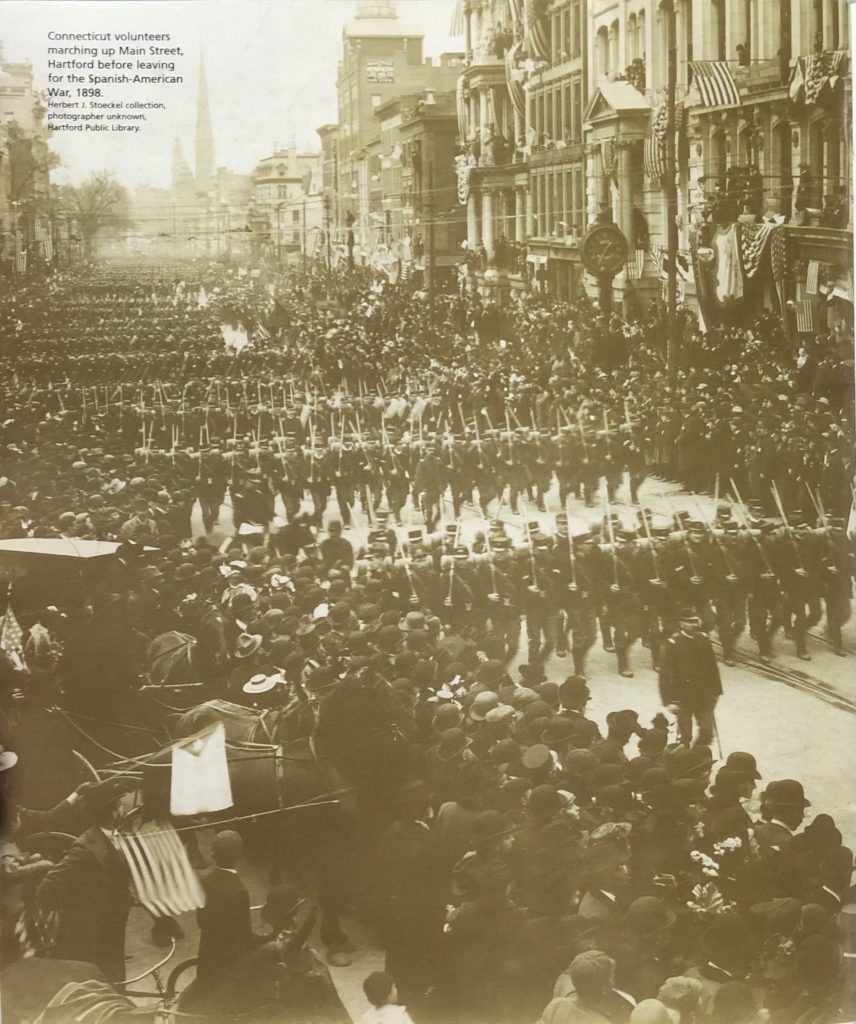
Connecticut volunteers marching on Main Street, Hartford, before leaving for the Spanish-American War, 1898. Herbert J. Stoeckel collection, Hartford History Center, Hartford Public Library
(c) Connecticut Explored Inc. 2003 Nov/Dec/Jan 2004
Subscribe/Buy the Issue!
The following abridged letter was written by Ensign Louis F. Middlebrook of the Second Division, Connecticut Naval Militia from the U.S.S. Jason at the close of the Spanish-American War. Middlebrook was stationed off Long Island, where 16,000 ill U.S. troops were quarantined after serving in the 15-week conflict in Cuba. The letter’s recipient passed it on to the Hartford Courant, which published it on August 31, 1898. The published letter is part of Middlebrook’s scrapbook collection, now at the Connecticut Historical Society.
Off Camp Wickoff, Montauk, NY
Aug. 28, 1898.
We have through insistent solicitations from the department, been ordered to the camp of detention of the United States army here, and lie at anchor in Fort Pond bay, with every one of our 110 men in perfect health. But the object of our coming here is, in the sad sense of the mighty truth, fully realized. After a visit to the camp, where there are at present upwards of 16,000 troops from Cuba, both regulars and volunteers, the horrors of starvation, without the slightest exaggeration, are inconceivable. Our officers to a man all agree to the vast amount of suffering that is unnecessarily allowed. The sights of young fellows abarely 18 years old in the hospitals (without medical aid and with incompetent men nurses), to say nothing of the lack of drugs and proper medicine, is a fact that should be known to people outside the service.
I have personally visited the entire lines of over five miles—hospitals and all, and return aboard this ship tonight with a heavy heart, to stand my watch, knowing that ashore there are men who left luxurious and comfortable surroundings from a patriotic motive entirely, who are actually dying from lack of attention. Passed Assistant Surgeon McEvitt, U.S.N., of our ship has been ashore all day, voluntarily, working with a might, trying to alleviate the suffering, and this evening makes the most remarkable statements concerning his own experiences. The location, however, is delightful, and the large converted ocean and coast line steamships lie at anchor here—six or eight of them at a time, waiting chance to disembark the poor, miserably fed soldiers who have suffered everything, for the glad tidings you have read in the papers about the chain of victories won in Cuba, and who are now unable to march to their tents.
In going alongside of one of the transports to-day to deal out provisions and a few medical supplies to the soldiers, with our launch, the frightful eagerness for bread as they swarmed and pushed one another aside, through the cargo ports, was simply staggering to one’s senses—the stench from the transports being discernable from our little launch while within fifty feet of the gangway… . Our surgeon was then asked if he could take charge of three division tents (containing some forty-five patients) and took him over and showed him what was to be done. The men were found in their cots with their uniforms on, some of them with their shoes on, and upon going to their bedsides they complained they had received no medical attention and were suffering from want of food, medicines and attentions of all kinds. There were no conveniences whatever for the needs of nature. They were unable to walk outside their tents and there was nobody to assist them (quarantine camp, you know). Upon inquiry he was told that no physician had ever asked after their suffering from time of detention. Some of the men were delirious, and all sick. The had been asking for water all day without having their thirst gratified. The surgeon who was supposed to have charge of these men was sent for, and upon his appearance, he was accused of being drunk, was drunk, and was ordered to his quarters in disgrace. His records, blanks and papers were taken from him and the sick were turned over to our surgeon… .
There were no nurses, and regulars had to be impressed into the service, and upon sending for cups to administer the medicine the report came back that there were no cups, glasses or spoons. A requisition was made for bedpans for the poor fellows who were suffering from dysentery, but none could be had. Upon writing prescriptions and having written ten and sent them in to the apothecary the latter replied that he could not compound them because of the lack of necessary drugs… . Boiled bread and milk was ordered for the patients, which they greedily used, and conceded it was the best they had since they came to the hospital. Boxes of earth had to be improvised and brought into the tents of the men to use, as they were unable to walk, and then they had to be helped from their beds. They were nearly all in such a stupor that they took very little cognizance of a death in the next bed… .
Physicians, nurses, food and medicines are absolute necessities. Thanks to the noble work of the Red Cross and aid societies, or the deaths and pine headboards at the graves here would be innumerable by this time… . We are here in company with the Prairie, Alleen and Effrida and the gun-boat Vicksburg, trying to do missionary work the best we can with our small boats and steam launchers, but expect to be ordered to Philadelphia to the League Island yard to go out of commission every day, when I, with others, will probably be detached and ordered home. My best regards to all inquiring friends, hoping you are well.
Very respectfully,
L. F. Middlebrook
Ensign, U.S.N.
U.S.S. Jason
Explore!
Read more stories from the 2003 Nov/Dec/Jan 2004 issue
Read more stories about Connecticut at War on our TOPICS page.
